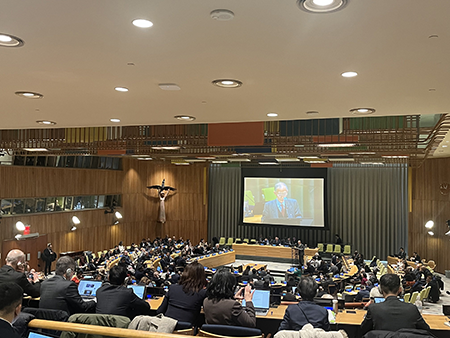“For half a century, ACA has been providing the world … with advocacy, analysis, and awareness on some of the most critical topics of international peace and security, including on how to achieve our common, shared goal of a world free of nuclear weapons.”
TPNW States Confront Escalating Nuclear Dangers
April 2025
By Shizuka Kuramitsu
States-parties to the Treaty on the Prohibition of Nuclear Weapons (TPNW) concluded their third meeting by renewing a commitment to effectively implement and universalize the pact amid escalating nuclear tensions.

Voicing growing concerns over global instability, the states-parties adopted a political outcome document that reaffirms the roles played by “the majority of non-nuclear-armed States … in bridging divides, promoting diplomacy, and reinforcing multilateralism.” They also recommitted “to unite and mobilize the international community around the imperative and urgency of progress toward eliminating the existential threat posed by nuclear weapons.”
The meeting was held March 3-7 in New York.
The treaty, which goes beyond other arms control agreements by banning nuclear weapons, entered into force Jan. 22, 2021, and has been ratified by 73 states. But its effectiveness is hampered by the fact that none of the states possessing nuclear weapons—China, France, India, Israel, North Korea, Pakistan, Russia, the United Kingdom, and the United States—have signed on.
The states-parties agreed that alarming international developments highlight the imperative of disarmament and nonproliferation initiatives. “Heightened geopolitical tensions, further expansion and modernization of nuclear arsenals, the increasing salience of nuclear weapons in military and security doctrines, including through security guarantees, and the growing dangers of nuclear proliferation and potentially devastating nuclear arms races demand immediate and decisive action from the international community,” the political outcome document stated.
At the opening session March 3, Izumi Nakamitsu, the UN high representative for disarmament affairs, said that “sadly, these trends have continued and only intensified. Geopolitical tensions remain unresolved, and are also dramatically evolving…. Yet, even in this challenging moment, there are reasons for hope, especially in relation to the full implementation of the TPNW.”
Ahead of the meeting, the officials who had been working on the intersessional initiative facilitated by Austria at the direction of the previous meeting of states-parties produced their report. (See ACT, January/February 2024.) It outlines a comprehensive assessment of how nuclear weapons pose security threats to the TPNW states and recommendations on how they can challenge the nuclear deterrence doctrines of nuclear-armed states.
In citing the report, the outcome document said that “nuclear deterrence is posited on the very existence of nuclear risk, which threatens the survival of all.” It added that the states-parties showed their commitment to expand efforts to continue challenging nuclear deterrence and aiming for a paradigm shift in nuclear doctrines.
On the TPNW mandate of establishing an international trust fund for victim assistance and environmental remediation from the consequences of nuclear use and testing, the meeting decided to produce a report no later than the end of July 2026.
The meeting occurred as states that are not TPNW members are intensifying reliance on nuclear deterrence in their security doctrines. On March 5, French President Emmanuel Macron said his government would be open to discussing nuclear extended deterrence with its European partners against the backdrop of possible shifts in U.S. security guarantees to NATO allies, as mooted by the Trump administration.
NATO members Belgium, Germany, and Norway observed the past two TPNW meetings but skipped this one. Albania was the only NATO member to attend, but left after the first day. According to a March 14 report in the Chugoku Shimbun, Hiroshima’s local newspaper, a NATO diplomat explained that NATO members, after consultations, decided to skip the meeting.
Japan also was absent, despite strong domestic pressure to attend the meeting for the first time as an observer after the 2024 Nobel Peace Prize was awarded to Nihon Hidankyo, the lobby group for World War II atomic bomb survivors known hibakusha. (See ACT, December 2024.)
Concluding the meeting, Akan Rakhmetullin of Kazakhstan, the meeting president, called the event a success. “The risks associated with [nuclear weapons] continued existence are greater than ever,” he said. “Our discussion this week reinforced the urgency of concrete steps towards a global disarmament.”
Fifty-five states-parties, 31 observer states, and 163 nongovernmental organizations participated in the weeklong TPNW meeting. South Africa was elected chair of the first TPNW review conference, set for November 2026.
